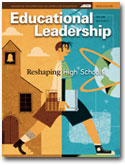One of the advantages of working in education is that school calendars are cyclical. Each year, teachers get a fresh start—and a formal culmination. No matter how difficult things may be in December or April, there's always a new beginning in September. Educators are lucky; although our past experiences matter and memories frame our thinking, we get to start over each year.
The school calendar also provides a logical stopping point to reflect on and analyze our work. But—just as the school year seems to fly by—unless we're careful, May quickly turns into September with nothing happening in between, and we lose a wonderful opportunity to learn.
Principals must seize time in spring to formally assess the preceding year while teachers are still in the building. The best assessment comes through dialogue. We need to discuss these key questions together: What criteria are we using to assess students and ourselves? How do we know what our students have learned? And how do we know how well we, the faculty, have performed? We will learn from one another by trying to find the answers together.
Reflecting Broadly on Growth
Our analysis should include test scores, but if we only review quantitative data, we end up looking at students too narrowly. We should ask ourselves in what other ways our students grew throughout the year, reflecting on their progress in all of the intelligences. Questions like, How have students grown in their understanding of art and music? lead to rich discussions. We find ourselves looking at students in new ways and discovering different strategies to help them learn.
We wouldn't judge a student sports team solely by its win-loss record. We would also consider whether more students participated and played than in previous years and whether players showed tenacity and sportsmanship. Likewise, in reviewing the academic year, we should discuss whether our students exhibited effort, care, and responsibility. Did students respect and appreciate those who are different from themselves throughout the year? How have we measured this, or how can we measure it?
We must also reflect on our school's culture. Was our school welcoming? Were students enthusiastic, parents involved, and teachers invested? We'll never have the exact school we want, of course; our schools will always be works in progress (just like us). But we need to ask if we're makingprogress. Are the attitudes, behaviors, and systems our school ended up with in May better than those we started with in September? Are they better this year than last? If yes, why is this the case, and how can we capitalize on this growth? If no, what needs to change?
The Power of Surveys
I have found that surveys are a great way to get information about many of these issues. Although principals do need to have conversations and meetings with our teachers, surveys enable us to question a wider audience and get thoughtful and candid perceptions. I regularly survey staff members and parents. I always ask parents to agree or disagree with the statement "My child's individual needs have been met." That's an intimidating measure, but we need to hear parents' responses. I always ask teachers if I have been helpful to their growth. It's important to end all surveys with an open-ended invitation for the respondent to share thoughts on any issue.
On the basis of parent survey results, the New City School recently began giving more attention to spelling instruction. Surveys also help identify what we do well, which enables me to give kudos to my staff.
Eliciting others' perceptions in this way is an important first step in creating a team. School leaders need to know in what ways others agree with us and in what ways they see things differently, and incorporate this knowledge into our planning. Our goals and strategies should reflect not only our own views of what our school has accomplished and where we need improvement, but also our constituents' views on the same questions. Schools are social institutions, and real progress comes from everyone working together.
Personal Reflection—and Refreshment
As we review the year, principals also need to reflect on personal performance. What did we accomplish? In which areas were we successful, in which areas do we feel frustrated, and in which areas do we wish we could have a "do-over"? What practices should we continue and what should we change?
A word of caution: It's easy to focus on what we didn't do as well as we'd hoped. Just as we want our teachers to approach students with realistic expectations tied to their developmental level, we need to be realistic with ourselves about what we can accomplish. In setting goals, we should not only stretch ourselves but also aim for success.
Finally, as we look ahead to the reopening of school, we need to think about preparing ourselves. What can we do this summer to refresh ourselves as people, not just educators? We may be attending a top education conference or taking a leadership class, but that's not what I mean. Summer is the time to sign up for that pottery course or to enroll in the kickboxing class. It's the time to read some of those books on your bedside table—or even find out if you have a great American novel in you. Whatever you've dreamed about, do it. August will be here before we know it.
